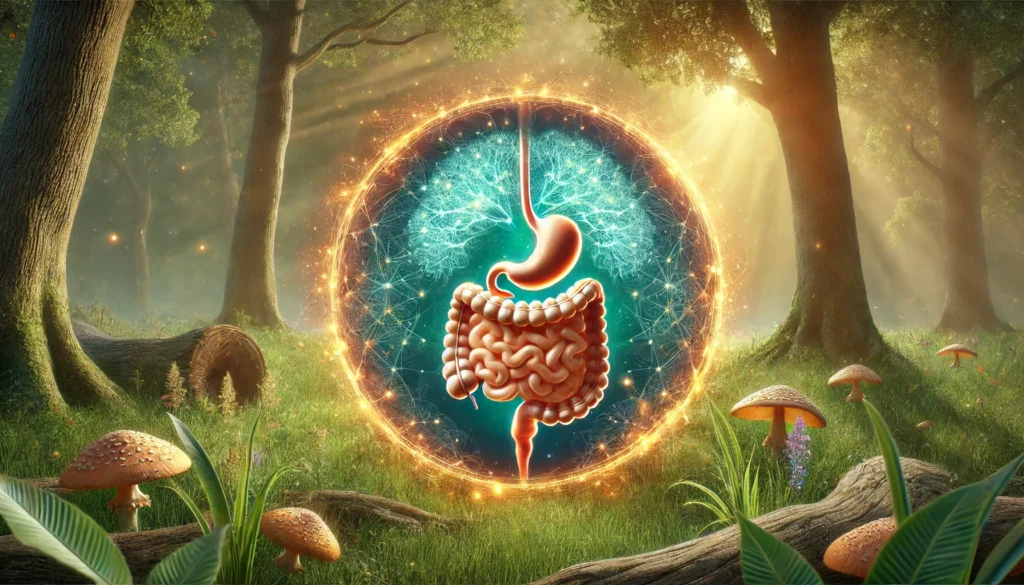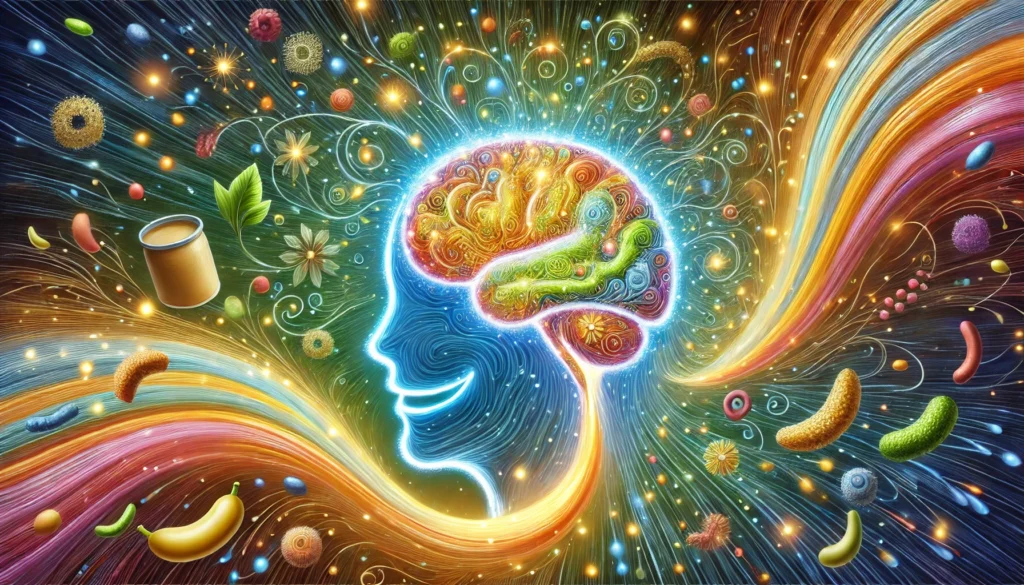The link between gut health and mental well-being has become an increasingly significant focus of scientific research in recent years. Many individuals struggling with anxiety and depression are beginning to explore how gut health influences mood, cognition, and overall mental health. The gut-brain axis, a complex communication network between the digestive system and the brain, plays a critical role in emotional regulation and cognitive function. Understanding how to improve gut health for anxiety and depression can lead to profound improvements in mental well-being.
You may also like: How to Improve Gut Health Naturally: Science-Backed Tips for a Stronger Microbiome
The Gut-Brain Axis: Understanding the Connection
The gut-brain axis is a bidirectional communication system involving the central nervous system, enteric nervous system, endocrine pathways, immune function, and microbiota. The trillions of microorganisms in the gut, collectively known as the gut microbiome, influence neurotransmitter production, inflammatory responses, and stress resilience. When gut health is compromised, it can lead to increased inflammation, hormonal imbalances, and impaired neurotransmitter synthesis, all of which contribute to symptoms of anxiety and depression.
Scientific studies have shown that individuals with mood disorders often have imbalanced gut microbiomes compared to those without mental health issues. Dysbiosis, or an imbalance in gut bacteria, can result from poor diet, chronic stress, antibiotic overuse, and other lifestyle factors. This disruption can reduce the production of beneficial compounds such as short-chain fatty acids (SCFAs) and serotonin, both of which are essential for mental stability and emotional resilience.
Nutritional Strategies to Enhance Gut Health and Improve Mental Well-Being
One of the most effective ways to support gut health and improve mental well-being is through diet. The food we consume directly influences the composition and diversity of the gut microbiome, affecting how our brains process stress and emotions. A diet rich in fiber, prebiotics, probiotics, and essential nutrients can promote the growth of beneficial bacteria while reducing inflammation and oxidative stress.
Prebiotic and Probiotic Foods for Gut Health
Prebiotics are non-digestible fibers that serve as food for beneficial gut bacteria, helping them thrive and maintain balance. Foods rich in prebiotics include garlic, onions, leeks, asparagus, bananas, and whole grains. Probiotics, on the other hand, introduce beneficial bacteria into the gut, replenishing microbiome diversity. Fermented foods such as yogurt, kefir, sauerkraut, kimchi, miso, and kombucha are excellent sources of probiotics that can enhance gut function and support mental health.
The Role of Fiber in Gut and Brain Health
Fiber plays a crucial role in gut health by promoting regular bowel movements, feeding beneficial gut bacteria, and reducing inflammation. Soluble fiber, found in foods like oats, beans, and apples, helps regulate blood sugar levels and supports the production of SCFAs, which have anti-inflammatory properties. Insoluble fiber, found in whole grains, nuts, and seeds, aids in digestion and prevents constipation, a common issue linked to gut dysbiosis and mood disturbances.
Essential Nutrients for Mental and Gut Health
Certain nutrients are vital for maintaining both gut health and mental well-being. Omega-3 fatty acids, found in fatty fish, flaxseeds, and walnuts, have anti-inflammatory properties that support brain function and neurotransmitter balance. Vitamin D, obtained through sunlight exposure and foods like egg yolks and fortified dairy products, plays a role in serotonin production. Magnesium, present in leafy greens, nuts, and seeds, helps regulate the nervous system and reduce stress-induced inflammation in the gut.

The Impact of Lifestyle Factors on Gut and Mental Health
Beyond nutrition, lifestyle factors significantly influence gut health and its effects on anxiety and depression. Stress management, physical activity, sleep quality, and environmental exposures all play a role in maintaining a healthy gut microbiome.
Stress Reduction Techniques to Support Gut Health
Chronic stress disrupts gut microbiota composition, increases intestinal permeability (leaky gut), and triggers inflammatory responses that exacerbate anxiety and depression. Mindfulness practices, meditation, deep breathing exercises, and yoga can help regulate the stress response, promoting a balanced gut-brain connection. Engaging in creative activities, spending time in nature, and fostering social connections also contribute to stress reduction and gut microbiome stability.
The Role of Physical Activity in Gut and Brain Function
Regular physical activity enhances gut motility, increases microbial diversity, and reduces inflammation, all of which contribute to better mental health. Aerobic exercises like walking, running, and cycling stimulate the production of brain-derived neurotrophic factor (BDNF), a protein essential for neural plasticity and mood regulation. Strength training and resistance exercises further support metabolic health, reducing the risk of gut-related disorders that impact mental well-being.
The Importance of Quality Sleep for Gut and Mental Health
Sleep disturbances and poor sleep hygiene can negatively impact gut bacteria composition and increase stress hormone levels. Prioritizing a consistent sleep schedule, creating a relaxing bedtime routine, and minimizing screen exposure before bed can significantly improve sleep quality. Additionally, consuming sleep-supportive nutrients such as tryptophan (found in turkey, dairy, and nuts) and magnesium can promote relaxation and enhance gut function overnight.
Healing My Gut Cured My Anxiety: Personal Stories and Scientific Evidence
Many individuals who have focused on healing their gut have reported significant reductions in anxiety symptoms. While personal anecdotes provide compelling insights, scientific evidence also supports the connection between gut health and emotional stability. Studies have demonstrated that probiotic supplementation can reduce symptoms of generalized anxiety disorder (GAD), social anxiety, and depression by modulating the gut microbiota and influencing neurotransmitter production.
One study found that participants who consumed a probiotic-rich diet experienced lower cortisol levels, the primary stress hormone associated with anxiety. Another study revealed that individuals who took specific strains of probiotics, such as Lactobacillus and Bifidobacterium, showed improvements in mood, cognition, and emotional resilience. These findings highlight the therapeutic potential of gut health interventions in managing anxiety and depression.

Frequently Asked Questions (FAQ) on Gut Health and Mental Well-Being
1. How long does it take to see improvements in anxiety and depression after making gut health changes?
The timeline for noticeable improvements in anxiety and depression through gut health interventions varies from person to person. Some individuals report feeling better within a few weeks of dietary and lifestyle changes, while others may take several months to experience significant mental health benefits. The diversity and resilience of one’s gut microbiome, the severity of gut dysbiosis, and the consistency of dietary and lifestyle modifications all influence the speed of improvement. Probiotic supplementation, increased fiber intake, and stress reduction strategies work synergistically to rebalance the gut microbiota, but patience and persistence are essential. Individuals should also track their progress through mood journals or professional evaluations to measure long-term benefits.
2. Can healing my gut completely cure my anxiety and depression?
While some individuals claim that healing their gut cured their anxiety, it is essential to approach this claim with scientific nuance. Gut health plays a crucial role in mental well-being, but anxiety and depression are multifactorial conditions influenced by genetics, environmental factors, and psychological health. Improving gut health can significantly reduce symptoms and enhance mood stability, but it is not always a standalone cure. Combining gut-focused interventions with therapy, mindfulness, and other holistic approaches can yield the most effective and sustainable mental health improvements. Consulting a healthcare professional ensures a comprehensive treatment plan tailored to individual needs.
3. Are there specific probiotic strains that are more effective for anxiety and depression?
Not all probiotics have the same impact on mental health, as different strains influence the gut-brain axis in unique ways. Research suggests that Lactobacillus and Bifidobacterium species are particularly beneficial for reducing anxiety and depression symptoms. Strains such as Lactobacillus rhamnosus, Lactobacillus helveticus, Bifidobacterium longum, and Bifidobacterium breve have been shown to regulate stress responses, enhance serotonin production, and reduce inflammation. When selecting a probiotic supplement, choosing one with clinically studied strains and sufficient colony-forming units (CFUs) can maximize its effectiveness. It is also beneficial to incorporate probiotic-rich foods like kefir, kimchi, and sauerkraut into a balanced diet for a more holistic approach.
4. How does stress negatively impact gut health and contribute to anxiety and depression?
Chronic stress disrupts gut health by altering the gut microbiome composition, increasing intestinal permeability (leaky gut), and triggering systemic inflammation. Stress-induced changes can reduce beneficial bacteria populations while promoting the growth of harmful microbes that release neurotoxic compounds. This imbalance affects neurotransmitter production, particularly serotonin and gamma-aminobutyric acid (GABA), which are crucial for mood regulation. Additionally, stress hormones like cortisol can slow digestion, leading to gut discomfort, bloating, and nutrient malabsorption, further exacerbating mental health symptoms. Adopting stress management techniques such as meditation, deep breathing, and regular exercise can help restore gut balance and improve emotional resilience.
5. Can certain medications harm gut health and worsen anxiety and depression?
Yes, certain medications can negatively affect gut health, leading to increased susceptibility to anxiety and depression. Antibiotics, while necessary for treating bacterial infections, can disrupt the gut microbiome by killing both harmful and beneficial bacteria. Proton pump inhibitors (PPIs) used for acid reflux can alter stomach acidity and microbial diversity, affecting digestion and nutrient absorption. Nonsteroidal anti-inflammatory drugs (NSAIDs) can damage the gut lining, contributing to inflammation and increased permeability. To mitigate these effects, individuals can incorporate prebiotic and probiotic-rich foods, consult healthcare providers about alternative treatments, and practice gut-supportive habits like hydration and balanced nutrition.
6. How do fermented foods compare to probiotic supplements for improving gut health and mental well-being?
Fermented foods and probiotic supplements both contribute to gut health, but they differ in their mechanisms and benefits. Fermented foods such as yogurt, miso, and kombucha provide a natural source of probiotics alongside bioactive compounds, enzymes, and beneficial metabolites that enhance gut function. They also contain diverse strains that can adapt to the gut environment more effectively than some supplements. Probiotic supplements, however, offer concentrated doses of specific bacterial strains that have been clinically studied for their impact on anxiety and depression. A combination of both approaches can optimize gut microbiome diversity and resilience, leading to more sustained mental health benefits.
7. What role does gut permeability (leaky gut) play in anxiety and depression?
Increased intestinal permeability, often referred to as leaky gut, occurs when the gut lining becomes compromised, allowing toxins, pathogens, and undigested food particles to enter the bloodstream. This triggers systemic inflammation and immune responses that can impact brain function and contribute to mood disorders. Research suggests that individuals with anxiety and depression often have markers of gut permeability, linking digestive health to mental well-being. Strengthening the gut barrier through adequate fiber intake, omega-3 fatty acids, polyphenols, and glutamine-rich foods can help reduce inflammation and improve overall emotional stability. Additionally, avoiding processed foods, excessive alcohol, and chronic stress can prevent further gut barrier dysfunction.
8. How does gut health influence sleep quality, and why is this important for mental health?
The gut and brain communicate closely through the production of neurotransmitters and hormones that regulate sleep cycles. The gut microbiota influences melatonin and serotonin levels, both of which are essential for maintaining a healthy circadian rhythm. Disruptions in gut health can lead to poor sleep quality, which in turn exacerbates anxiety and depression. Research has shown that individuals with imbalanced gut bacteria often experience insomnia, fragmented sleep, or excessive daytime fatigue. Supporting gut health through diet, stress management, and probiotic supplementation can enhance sleep quality, leading to improved mood and cognitive function.
9. Can gut health influence how we respond to antidepressants and other psychiatric medications?
Yes, gut health plays a significant role in determining how individuals metabolize and respond to psychiatric medications. The gut microbiome can influence drug absorption, metabolism, and efficacy through enzyme production and interactions with neurotransmitter pathways. Individuals with gut dysbiosis may experience reduced drug effectiveness or heightened side effects, making it challenging to achieve symptom relief. Some emerging studies suggest that restoring gut balance through prebiotics, probiotics, and diet modifications can enhance the effectiveness of antidepressants. Discussing gut health strategies with a healthcare provider can help optimize treatment plans and improve overall mental well-being.
10. Are there any emerging trends or future research areas exploring the gut-brain connection and mental health?
The field of psychobiotics, which focuses on how probiotics and gut-targeted therapies influence mental health, is rapidly expanding. Researchers are exploring the potential of precision probiotics—customized strains tailored to an individual’s gut microbiome—to treat specific mental health disorders. Fecal microbiota transplants (FMTs) are also being studied for their potential to reset the gut microbiome in treatment-resistant depression. Additionally, advancements in gut microbiome testing are allowing individuals to receive personalized dietary and probiotic recommendations for improved mental health. As scientific understanding deepens, gut-based interventions may become a standard component of psychiatric care in the future.

Conclusion: Embracing Gut Health as a Pathway to Mental Well-Being
The emerging field of psychobiotics, which explores the relationship between gut bacteria and mental health, continues to provide valuable insights into how dietary and lifestyle changes can enhance emotional well-being. Understanding how to improve gut health for anxiety and depression empowers individuals to take proactive steps toward mental resilience. By prioritizing gut-friendly nutrition, stress management techniques, regular physical activity, and adequate sleep, individuals can support their gut microbiome and experience improved mood stability.
Healing my gut cured my anxiety is a sentiment shared by many who have embraced holistic approaches to mental wellness. While individual results may vary, the scientific consensus highlights the profound impact of gut health on brain function. By integrating these science-backed strategies into daily life, individuals can foster long-term mental well-being and enhance their overall quality of life.
gut microbiome and mental health, probiotics for mental wellness, gut-brain connection research, dietary impact on mood, microbiome diversity and anxiety, fermented foods for mental clarity, prebiotic-rich diet, gut bacteria and serotonin, natural ways to reduce anxiety, digestive health and depression, holistic mental health strategies, inflammation and brain function, neurotransmitters and gut health, gut flora and emotional resilience, mind-gut wellness, stress and digestive balance, fiber for gut-brain harmony, microbiota and cognitive function, mental clarity through nutrition, psychobiotics for anxiety relief
Further Reading:
Diet and depression: Foods to eat and avoid
How to Improve and Reset Gut Health
Can Gut Bacteria Influence Mental Health?
Disclaimer
The information contained in this article is provided for general informational purposes only and is not intended to serve as medical, legal, or professional advice. While Health11News strives to present accurate, up-to-date, and reliable content, no warranty or guarantee, expressed or implied, is made regarding the completeness, accuracy, or adequacy of the information provided. Readers are strongly advised to seek the guidance of a qualified healthcare provider or other relevant professionals before acting on any information contained in this article. Health11News, its authors, editors, and contributors expressly disclaim any liability for any damages, losses, or consequences arising directly or indirectly from the use, interpretation, or reliance on any information presented herein. The views and opinions expressed in this article are those of the author(s) and do not necessarily reflect the official policies or positions of Health11News.


